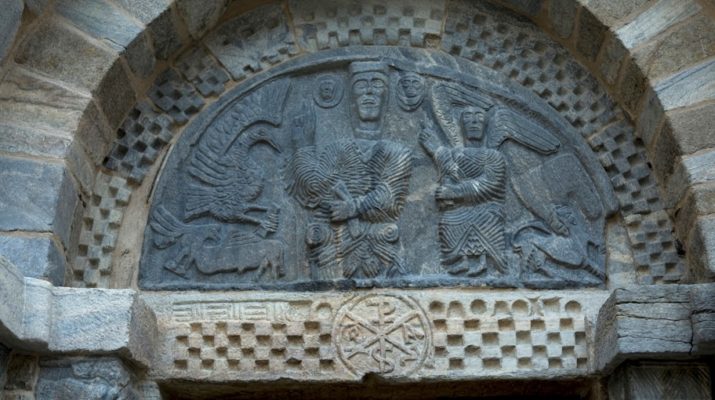Revelation 22:12-14, 16-17, 20-21
Eastertide C27
12 “See,A I am comingB soon;C my rewardD is with me, to repayE according to everyone’s work.F
A “see” = idou. From eido (to be aware, see, know, remember, appreciate). This is see! Lo! Behold! Look! Used to express surprise and or draw attention to the statement.
B “coming” = erchomai. This is to come or go.
C “soon” = tachu. 12x in NT. From tachus (quickly, promptly; without unreasonable delay). This is quickly, but not immediately. It is without undue delay.
D “reward” = misthos. This is wages, pay, or salary. It can also be reward, recompense, or punishment. It is pay for services rendered in a literal or figurative way, either good or bad.
E “repay” = apodidomi. From apo (from, away from) + didomi (give, offer, place, bestow, deliver; give in a literal or figurative sense). This is to give back, return, give away. It is to restore as when one makes payment – to rend what is due, to sell.
F “work” = ergon + eimi. Ergon is from ergo (to work, accomplish, do). This is work, task, deed, labor, effort. Eimi is to be or to exist.
13 I am the AlphaG and the Omega,H the FirstI
G “Alpha” = Alpha. 4x in NT– all in Revelation. “From Phoenician ? (ʾ /ʾālep/; first letter of alphabet);” “From Proto-Canaanite , from Proto-Sinaitic , from Egyptian ? (see kꜣ) representing an ox head, whence the letter name ??? (ʾlp, “head of cattle”).”” This is Alpha, the beginning of the Greek alphabet. It can be used a prefix (meaning “un-” or “with”). It can also mean 1 or 1,000. See https://en.wiktionary.org/wiki/alpha & https://en.wiktionary.org/wiki/%F0%90%A4%80#Phoenician
H “Omega” = O. 4x in NT. From o (Omega; also oh!) + megas (big in a literal or figurative sense – great, large, exceeding, abundant, high, mighty, perfect, strong, etc). This is Omega, the letter, which literally means “big o.” Figuratively, it can refer to infinity or finality. See https://en.wiktionary.org/wiki/omega
I “First” = protos. From pro (before, first, in front of, earlier). This is what is first, which could be the most important, the first in order, the main one, the chief.
and the Last,J the BeginningK and the End.”L
J “Last” = eschatos. Related to eschaton (end, last); perhaps from echo (to have, possess, hold). This is last, end, extreme, final. It is often used to discuss the end times, prophecies of the future, and the afterlife. The branch of theology focusing on all these topics is called “eschatology.”
K “Beginning” = arche. From archomai (to begin or rule); from archo (to rule, begin, have first rank or have political power). Properly, this is what is first. In a temporal sense, that is beginning or origin. It can also refer to the one who ranks first, i.e. king or ruler. So, it can also be magistrate, power, or principality. It can be used more generally for what is preeminent.
L “End” = telos. From tel– (to reach a goal or aim); This is an end, aim, purpose, completion, goal, consummation, or tax. It is completing a stage of something and everything that results from that completion. It can be literal or figurative.
14 BlessedM are those who washN their robes,O so that they will haveP the rightQ
M “blessed” = markarios. From makar (happy); from mak– (to become long or large). This is blessed, happy, fortunate. It is when God’s grace/abundance is extended.
N “wash” = pluno. 3x in NT. Perhaps from pluo (to flow). This is to wash as in washing clothes by plunging.
O “robes” = stole. 9x in NT – the scribes who want to be greeted with respect in marketplaces (Mk 12:13; Lk 20:46), the angel presenting as a young man at the resurrection (Mk 16:5), the robe brought for the prodigal son (Lk 15:22), and the attire of the martyrs and saints in heaven in Revelation 6, 7, and 22. From stello (to set, arrange, prepare, provide for); {probably from histemi (to stand, place, set up, establish, stand firm)}. This is clothing, in particular a long, flowing robe associated with elites.
P “have” = eimi. Same as “work” in v12. See note F above.
Q “right” = exousia. Related to “work” in v12. From exesti (to be permitted or lawful); {from ek (out, out of) + eimi (see note F above)}. This is power to act or weight. It especially denotes moral authority or influence. It can mean domain, liberty, freedom, capacity, mastery, right, force, or strength.
to the treeR of lifeS and may enterT the cityU by the gates.V
R “tree” = xulon. This refers to things made of wood such as a tree trunk, club, staff, or cross. It can also refer to timber used as fuel for a fire.
S “life” = zoe. From zao (to live, be alive). This is life including the vitality of humans, plants, and animals – it is life physical and spiritual and life everlasting.
T “enter” = eiserchomai. Related to “coming” in v12. From eis (to, into, for, among) + erchomai (see note B above). This is to go in in a literal or figurative sense.
U “city” = polis. This is a city or its inhabitants. It is a town of variable size, but one that has walls. This is where “metropolis” and “police” come from.
V “gates” = pulon. 18x in NT. From pule (gate, large entrance to a city or a fortress; often used for an exit way; often figurative for authority and power). This is a porch, gateway, or vestibule. It is a passageway from the street through the house to the courtyard.
16 “It is I, Jesus,W who sentX my angelY to you
W “Jesus” = Iesous. From Hebrew Yehoshua (Joshua, the Lord is salvation); {from YHVH (proper name of the God of Israel; the self-existent and eternal one); {from havah (to become) or from hayah (to come to pass, become, be)} + yasha (to deliver, defend, help, preserve, rescue; properly, to be open, wide or free, which implies being safe. So, in a causative sense, this is to free someone)}. This is Jesus or Joshua in Greek – the Lord saves or the Lord is salvation.
X “sent” = pempo. This is to send, put forth, or dispatch. This often refers to a temporary errand. It is sending someone with a focus on the place they departed from. By contrast, another Greek word, hiemi, emphasizes the destination and yet another word, stello, focuses on the motion that goes with the sending.
Y “angel” = aggelos. Probably from ago (to lead, bring, carry, guide) + agele (flock, herd, drove); {also from ago (see above)}. This is angel or messenger. Properly, it is one sent with news or to perform a specific task. This messenger can be human or an angel from heaven. More commonly, it is used for angels in the New Testament.
with this testimonyZ for the churches.AA I amBB the rootCC
Z “testimony” = martureo. From martus (a witness whether having heard or seen something; witness literally, judicially, or figuratively; by analogy, a martyr). This is to bear witness, testify, give evidence. It is to testify in a literal or figurative sense.
AA “churches” = ekklesia. From ek (from, out from) + kaleo to call by name, invite, to name, bid, summon, call aloud) {related to keleuo (to command, order, direct); from kelomai (to urge on)}. This is properly a calling out or an assembly. It was used to refer to a church.
BB “am” = eimi. Same as “work” in v12. See note F above.
CC “root” = rhiza. 17x in NT. This is a root literally or figuratively so it would be the root of what comes from it – shoot, source, descendant. This is where the word “rhizome” comes from.
and the descendantDD of David,EE the brightFF morningGG star.”HH
DD “descendant” = genos. From ginomai (to come into being, to happen, become, be born; to emerge from one state or condition to another; this is coming into being with the sense of movement or growth). This is family, offspring, kin – in a literal or figurative sense.
EE “David” = Dauid. From Hebrew David (David); from the same as dod (beloved, love, uncle); the root may mean to boil, which is used figuratively to describe love. So, this implies someone you love such as a friend, a lover, or a close family member like an uncle. David’s name likely means something like “beloved one.”
FF “bright” = lampros. 9x in NT. From the same as lampas (a torch or lantern that was hand held, perhaps made of clay with a flax wick and oil); from lampo (to give light literally or figuratively). This is literally bright or shining. By analogy, it can be splendid, gorgeous, fine (of quality), or gleaming white.
GG “morning” = proinos. 2x in NT. From proi (early, at dawn, during the daybreak watch); from pro (before, earlier than, ahead, prior). This is related to the morning, matutinal, early.
HH “star” = aster. Perhaps from stronnumi (to spread, furnish, strew). This is a star in a literal or figurative sense.
17 The SpiritII and the brideJJ say, “Come.”
And let everyone who hearsKK say, “Come.”
And let everyone who is thirstyLL come.
II “Spirit” = Pneuma. From pneo (to blow, breathe, breathe hard). This is wind, breath, or ghost. A breeze or a blast or air, a breath. Figuratively used for a spirit, the human soul or part of us that is rational. It is also used supernaturally for angels, demons, God, and the Holy Spirit. This is where pneumonia comes from.
JJ “bride” = numphe. 8x in NT. Perhaps from nupto (to put on a veil as a bride does – in Latin nupto means simple to marry); related to numphon (the room where the marriage bed is). This is bride, daughter-in-law, young wife, or young woman. This shares a root with “nymph” and “nymphomaniac.”
KK “hears” = akouo. This is hear or listen, but it also means to understand by hearing. This is where the word “acoustics” comes from.
LL “is thirsty” = dipsao. 16x in NT. From dipsa (thirst); from dipsos (thirst). This is thirst in a literal or figurative sense. Can also mean keenly desire.
Let anyone who wishesMM takeNN the waterOO of life as a gift.PP
MM “wishes” = thelo. This is to wish, desire, will, or intend. It is to choose or prefer in a literal or figurative sense. It can also mean inclined toward or take delight in. It can have a sense of being ready to act on the impulse in question.
NN “take” = lambano. It does not refer to passive receiving of something, but active acceptance or taking of something whether it is offered or simply nearby. It focuses on individual decision and action.
OO “water” = hudor. Perhaps from huetos (rain); from huo (to rain). This is water literal or figurative. It is one of the roots that “hydrogen” and “hydroelectric” come from.
PP “as a gift” = dorean. Related to “repay” in v12. 9x in NT. From dorea (a free gift given voluntarily and not received by merit or entitlement; emphasizes the benevolence of the giver); from doron (gift, offering, sacrifice; emphasizes that the gift is given freely, voluntarily); from didomi (see note E above). This is freely, without purpose, a free gift, unearned not for merit or obligation. It is freely in a literal or figurative sense.
20 The one who testifiesQQ to these things says, “SurelyRR I am coming soon.”
Amen.SS Come, LordTT Jesus!
QQ “testifies” = martureo. Same as “testimony” in v16. See note Z above.
RR “surely” = nai. This is yes, truly, indeed. It is a strong affirmation.
SS “amen” = amen. From Hebrew amen (verily, truly, amen, truth, so be it, faithfulness); from aman (to believe, endure, fulfill, confirm, support, be faithful, put one’s trust in, be steadfast. Figuratively, this is to be firm, steadfast, or faithful, trusting, believing, being permanent, morally solid). This word is literally firmness, but figuratively fidelity, faithfulness, honesty, responsibility, trust, truth, steadfastness. Properly, it is to be sure, certain, or firm. This is a word of emphasis indicating that something crucial follows.
TT “Lord” = Kurios. From kuros (authority, supremacy). This is a respectful address meaning master or sir. It refers to one who has control or power greater than one’s own. So, it was also applied to God and Jesus as Master or Lord.
21 The graceUU of the Lord JesusVV be with allWW the saints.XX Amen.
UU “grace” = charis. From chairo (to rejoice, be glad; used to say hello; properly, delighting in the grace of God or experiencing God’s favor); from char– (to extend favor, lean towards, be inclined to be favorable towards). This is grace, kindness, favor, gratitude, thanks. It is the sense of being inclined to or favorable towards – leaning towards someone to share some good or benefit. This can be literal, figurative, or spiritual. It is grace as abstract concept, manner, or action.
VV {untranslated} = Christos. From chrio (consecrate by anointing with oil; often done for prophets, priests, or kings). Literally, the anointed one, Christ. The Greek word for Messiah.
WW “all” = pas. This is all or every.
XX “saints” = hagios. From hagnos (holy, sacred, pure ethically, ritually, or ceremonially; prepared for worship, chaste, unadulterated, pure to the core; undefiled by sin; figurative for innocent, modest, perfect). God is totally different from humanity and thus set apart. That which is consecrated to worship God (elements of worship) or to serve God (as the saints) are holy because they are now set apart for God’s purposes. Holy because important to God. This is sacred physically, pure. It can be morally blameless or ceremonially consecrated.
Image credit: North portal of the church of Bossòst, Val d’Aran, Catalonia, Spain. Photo by PMRMaeyaert, 2009.




